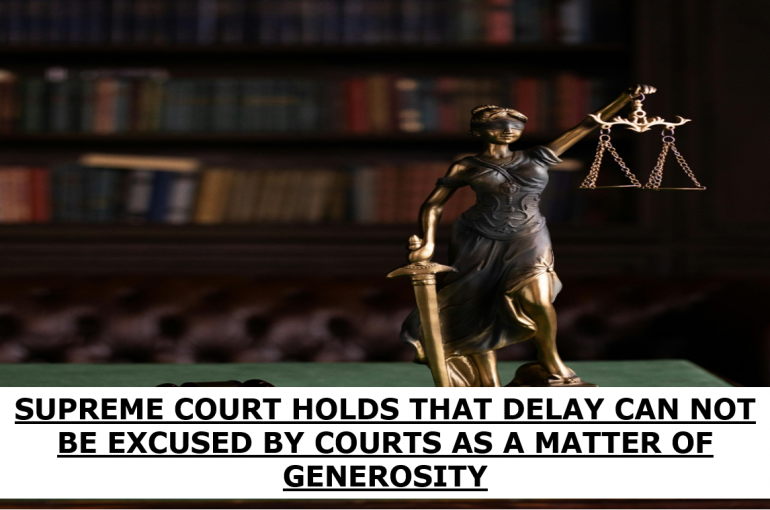SUPREME COURT HOLDS THAT DELAY CAN NOT BE EXCUSED BY COURTS AS A MATTER OF GENEROSITY
A two Judge Bench of the Supreme Court comprising of Justice Aniruddha Bose and Justice J.B Pardiwala passed a judgement dated 03.04.2024 in Union of India & Anr v. Jahangir Byramji Jeejeebhoy S.L.P. (Civil) No. 21096 of 2019 wherein the Bench was hearing an appeal against the Order passed by the Bombay High Court by declining the condonation of delay to the Appellants.
Facts
In this case, the Respondent leased the suit property situated at Staveley Road in Pune in favour of the Appellants on 09.03.1951. As the Appellants committed breach of the terms of the lease deed, the Respondent herein instituted Civil Suit bearing No. 2599 of 1981 before the Court of the Additional Small Causes Judge, Pune for the recovery of the possession of the suit property & arrears towards the rent. The Suit was allowed to proceed, and the final decree was issued against the Appellants. The Respondent received the possession of the suit property and also was granted damages and mesne profits for the same.
The Appellants later challenged the judgement and by preferring a Civil Appeal bearing No. 850 of 1987 in the Court of the District Judge, Pune. The aforesaid appeal was dismissed by Order and judgement dated 29.08.1992.
The judgement by the first appellate Court was again challenged in the High Court by invoking the supervisory jurisdiction of the High Court under Article 227 of the Constitution of India (Power of superintendence over all courts by the High Court) by way of Writ Petition bearing no. 2307 of 1993. The said Writ Petition was dismissed by the High Court vide Order dated 10.10.2006.
Later, another application was filed in the High Court for restoration of the W.P bearing no. 2307 of 1993 and for condonation of delay of 12 years and 158 days.
The ld. single Judge of the High Court vide impugned Order dated 09.07.2019 declined to condone the delay of 12 years and 158 days in filing the restoration application. Hence, the present appeal was filed in the Apex Court.
Issue
Whether the High Court committed an error in passing the impugned Order?
Decision by the Supreme Court
The High Court and the Supreme Court both were of the view that if the Appellants returned the possession of the Suit property back to the Respondent, then the Court may consider in restoring the Petition which came to be dismissed by the High Court.
However, the counsel for the Appellants denied to provide the possession back to the Respondent as the execution decree was not passed in favour of the Respondent.
The Supreme Court held that the present case was pending for the past 43 years and till now the Respondent has not been able to enjoy his peaceful possession of the property, and if the Hon’ble Court condones such huge delay, then it would be mockery of justice.
The Apex Court also held that once it is held that a party has lost his right to have the matter considered on merits because of their own inaction for such a long time, it cannot be presumed to be non-deliberate delay and in such circumstances of the case, he cannot be heard to plead that the substantial justice deserves to be preferred as against the technical considerations.
The Hon’ble Court relied on the judgement of Oriental Aroma Chemical Industries Limited v. Gujarat Industrial Development Corporation, (2010) 5 SCC 459, wherein the Supreme Court rejected the application for condonation of delay of 4 years in filing an application to set aside an ex-parte decree on the ground that the explanation offered for condonation of delay was found to be not satisfied.
The Apex Court also added that while examining the motion for condonation of delay, the Courts shall not begin with directly listening to the merits of the main case instead the Courts have a duty to first determine the veracity of the explanation provided by the party seeking condonation. It is only if the litigant’s sufficient reason and the opposing party’s opposition are equally balanced then the Court may consider the merits of the case in order to excuse the delay.
The Supreme Court dismissed the Appeal filed by the Appellants and provided that the decision by the High Court will not cause any injustice to the Appellants and the Appellants have failed to prove that they were reasonably diligent in prosecuting the matter, which is a vital test for condoning the delay.
Conclusion
After hearing the contentions, the Supreme Court held that the High Court committed no error much less any error of law in passing the impugned order. The Court also reiterated that a delay in seeking justice shall not be excused as a matter of generosity.
ARJAV JAIN
ASSOCIATE
THE INDIAN LAWYER & ALLIED SERVICES
Editor’s Comments
While the law offers a litigant an opportunity to file and appeal beyond the specified period with a condonation of delay application, the same is not a matter of right. When a litigant who has failed to approach the Court as per the timelines set out in the Limitation Act, approaches the Court for condoning the delay, such request must show a genuine reason and the litigant must be able to explain every day of the delay. Thereafter, it is the Court which decides that whether the delay is genuine or not and whether the litigant should be allowed to proceed with the matter. It is therefore advisable that any litigant who wants to go in appeal should be mindful and watchful of the period within which he/she can approach the Court.
SUSHILA RAM VARMA
CHIEF CONSULTANT
THE INDIAN LAWYER & ALLIED SERVICES





































Leave a Reply